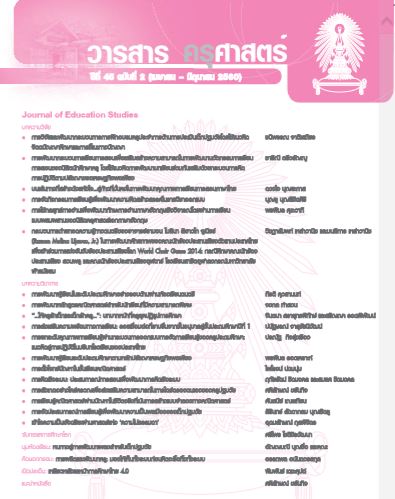การพัฒนากระบวนการเรียนการสอนเพื่อเสริมสร้างความสามารถในการพัฒนานวัตกรรมการเรียนการสอนของนิสิตนักศึกษาครู โดยใช้แนวคิดการพัฒนาบทเรียนร่วมกันเสริมด้วยกระบวนการคิดการปฏิบัติตามปรัชญาของเศรษฐกิจพอเพียง
Keywords:
กระบวนการเรียนการสอน, การพัฒนานวัตกรรมการเรียนการสอน, การพัฒนาบทเรียนร่วมกัน, ปรัชญาของเศรษฐกิจพอเพียง, นักศึกษาครู, INSTRUCTIONAL PROCESS, INSTRUCTIONAL INNOVATION DEVELOPMENT, LESSON STUDY, PHYLOSOPHY OF SUFFICIENCY ECONOMY, STUDENT TEACHERSAbstract
การวิจัยปฏิบัติการนี้มีวัตถุประสงค์หลักเพื่อพัฒนากระบวนการเรียนการสอนเพื่อเสริมสร้างความสามารถในการพัฒนานวัตกรรมการเรียนการสอนของนิสิตนักศึกษาครู โดยใช้แนวคิดการพัฒนาบทเรียนร่วมกันเสริมด้วยกระบวนการคิดการปฏิบัติตามปรัชญาของเศรษฐกิจพอเพียง กลุ่มเป้าหมาย คือ นิสิตปริญญาบัณฑิตชั้นปีที่ 4 สาขาวิชาประถมศึกษา คณะครุศาสตร์ จุฬาลงกรณ์มหาวิทยาลัยที่เรียนในรายวิชานวัตกรรมการสอนระดับประถมศึกษา ภาคปลาย ปีการศึกษา 2558 จำนวน 29 คน วงจรวิจัยปฏิบัติการมี 3 ระยะ ได้แก่ (1) การร่างกระบวนการเรียนการสอน (2) การนำกระบวนการเรียนการสอนไปใช้ และ (3) การปรับปรุงกระบวนการเรียนการสอนฉบับสมบูรณ์ การเก็บรวบรวมข้อมูลเพื่อพัฒนากระบวนการเรียนการสอนใช้ การสังเกต การสอบถาม การสัมภาษณ์ การศึกษาเอกสาร เครื่องมือที่ใช้ในการเก็บรวบรวมข้อมูลความสามารถในการพัฒนานวัตกรรมการเรียนการสอนของนิสิตมีจำนวน 2 ฉบับ ได้แก่ (1) แบบวัดความสามารถใน การพัฒนานวัตกรรมการเรียนการสอน และ (2) แบบประเมินผลงานนวัตกรรมการเรียนการสอน
ผลการวิจัยสรุปได้ว่า กระบวนการเรียนการสอนที่พัฒนาขึ้นส่งเสริมให้นิสิตนักศึกษาครูได้เรียนรู้ผ่านการลงมือปฏิบัติงานพัฒนานวัตกรรมการเรียนการสอนร่วมกันเป็นกลุ่มแบบร่วมมือรวมพลังตามขั้นตอนของกระบวนการพัฒนานวัตกรรมซึ่งมุ่งเน้นการสังเกตนักเรียนและการนำนวัตกรรมไปใช้ในบริบทจริงของชั้นเรียนและโรงเรียน ผ่านการมีส่วนร่วมของครูประจำการ ผู้เชี่ยวชาญ และผู้ที่เกี่ยวข้อง ผู้สอนทำหน้าที่เป็นที่ปรึกษาและผู้ชี้แนะที่ใช้คำถามกระตุ้นการคิดและการปฏิบัติตามปรัชญาของเศรษฐกิจพอเพียง จนได้ผลงานนวัตกรรมการเรียนการสอนที่สามารถนำไปใช้แก้ปัญหาและพัฒนานักเรียนได้จริง ขั้นตอนสำคัญของกระบวนการเรียนการสอนมี 4 ขั้นตอนที่ใช้ระยะเวลาตลอด 1 ภาคการศึกษา ได้แก่ (1) ขั้นสืบสอบความรู้และสังเกตนักเรียนเพื่อวางแผนพัฒนานวัตกรรมการเรียนการสอน (2) ขั้นออกแบบ ประดิษฐ์ และทดลองใช้นวัตกรรมการเรียนการสอน (3) ขั้นนำนวัตกรรมไปใช้จริงในโรงเรียนและสะท้อนคิดร่วมกับผู้รู้ และ (4) ขั้นเผยแพร่นวัตกรรมและสรุปการเรียนรู้ เมื่อนิสิตครูได้เรียนตามกระบวนการที่พัฒนาขึ้นแล้ว นิสิตส่วนใหญ่มีผลคะแนนจากแบบวัดความสามารถในการพัฒนานวัตกรรมการเรียนการสอนอยู่ในระดับดีมาก และนวัตกรรมการเรียนการสอนที่นิสิตพัฒนาขึ้นทุกผลงานได้รับผลการประเมินคุณภาพอยู่ในระดับดีมาก
This action research aimed to develop the instructional process for enhancing student teachers’ ability in developing instructional innovation by using the lesson study approach assisted by thinking and working processes based on the Philosophy of Sufficiency Economy. The target was 29 student teachers majoring in Elementary Education who registered in “Innovations in Teaching at the Elementary Education Level” course in the second semester of academic year 2015. This was a three-phase practical action research cycle including (1) drafting the instructional process, (2) implementing the instructional process, and (3) improving the instructional process. The data collected to improve the instructional process included observation, surveys, interviews and document analysis. The research instruments for measuring student teachers’ ability in developing instructional innovation were (1) the instructional innovation development ability test and (2) the instructional innovation assessment form.
The research results showed that the developed instructional process allowed the students to learn through hands-on learning experiences and collaborative work, through the instructional innovation development process that focuses on observing students and implementing their developed instructional innovation in actual classroom and school settings, as well as cooperatively working with in-service teachers, experts and other stakeholders. Meanwhile, the instructor worked as an advisor and coach and kept asking questions that emphasized the thinking and working processes based on the Philosophy of Sufficiency Economy continuously until the instructional innovation was completely developed and successfully applied to solve the students’ problems. Throughout the semester, the four steps of this process were implemented, i.e. (1) observing students and knowledge inquiry for planning to develop instructional innovation, (2) designing, inventing and piloting the instructional innovation, (3) implementing the innovation in school settings and debriefing with knowledgeable others, and (4) diffusing innovation and lesson learned summary. After learning with the developed instructional processes, most of the student-teachers obtained a very good score for the instructional innovation development ability test. Every single one of their developed instructional innovations was evaluated and ranked at a very good level.




